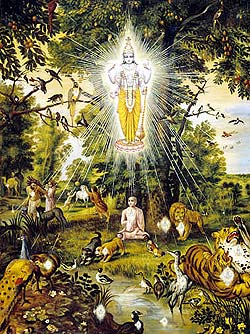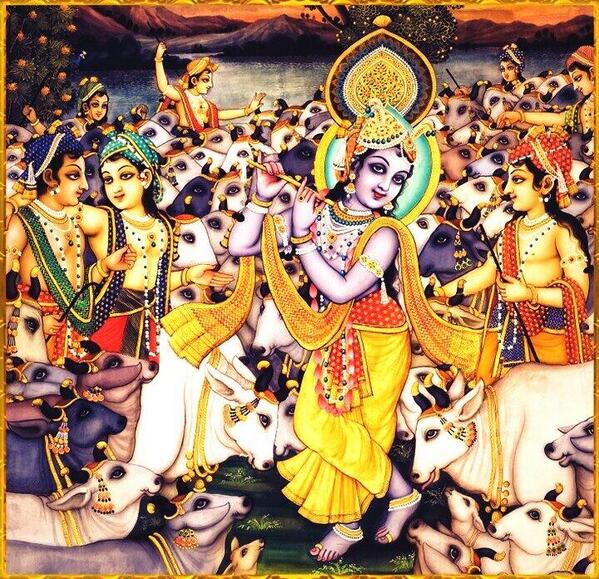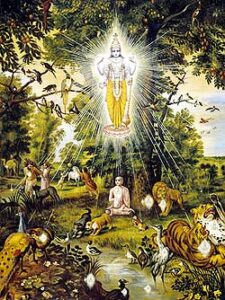The Supreme Person Posted in: Articles, Blog
In its most recent survey on the subject of God, the National Centre for Social Research found that some ninety percent of us claim to be believers. One in five even said they had no doubts about God’s existence. Such statistics are perhaps surprising, given that education today tends to steer us toward more atheistic notions such as the’ Big Bang’ and evolution. Surprising also in the face of the widely touted suggestion that religion is the cause of most conflicts, a suggestion seemingly reinforced by the ferocity of some of the more fundamentalist believers seen of late. Plainly, in spite of everything, faith in the divine is an enduring feature of the human mindset.
Although by its very definition belief in the supramundane cannot be proven by normal scientific methods or logic, for the faithful there are compelling enough reasons to accept God’s existence as fact. Many of the principal arguments were put forward by the Catholic theologian, Thomas Aquinas, who himself had borrowed from the Greeks (who in turn are said to have borrowed from India).
These arguments included the famous “argument by design”, which argues that things within this world tend toward certain goals and, like an arrow shot by an archer, must therefore have a designer who set those goals. Another shade of this argument is that anything we see in this world that exhibits complexity has been designed and indeed made by an intelligent person. A motor car, for example, will never come about by the chance combination material elements, it requires an intelligent manufacturer. Similarly the highly complex bio-system we see all around us could not have created itself.
Then there is the “original cause” argument, which argues that since we see nothing in existence that does not have a prior cause, it makes sense to assume that there must have been a first cause, i.e. God. Or the “goodness” argument, which posits that as we see relative degrees of goodness in this world, it is reasonable to say that there is a supreme good or God. And so on.
Srila Prabhupada also gave a number of arguments for God’s existence, such as realising that we are bound within a system of universal laws – e.g. we must grow old and die – and as we have no experience of any laws without lawmakers and upholders, we can reasonably assume there is a supreme lawmaker. He also pointed out that we have a propensity to love, that we are always trying to find somewhere to repose that love, and that there must therefore be an ultimate repository for all love in the form of God.
In the end, though, Vedic knowledge tells us that arguments are insufficient, and indeed we will find refutations of all the above from various philosophers. Therefore if we want to ascertain God’s existence beyond any doubt we must follow a spiritual process. We can then gain personal experience, which the Bhagavad-gita calls “direct perception” of God.
IS GOD A PERSON?
What then is God’s nature? What are we looking for in our spiritual practise? After all, unless we know the destination of a journey, how will we know when we have arrived? We must have some confirmation that our experience is genuine and not just some hallucination, as atheists will be quick to suggest.
There are widely varying concepts of the Supreme Being. While many people may speak of God, it is by no means certain that they are thinking of the same thing. For example, Einstein often referred to God, but this was not the omnipotent and omniscient person generally accepted by theistic believers. His was more of a pantheistic idea that followed from philosophers such as Spinoza, who suggested that God “reveals himself in the harmony of all being.”
Einstein and Spinoza’s grasping at some concept of God is not uncommon. Naturally as we try to contemplate the infinity of all existence our minds are baffled. This has led some people to suggest that God cannot be understood or conceived of in any way at all. But if we are following a spiritual path with God as our goal, then we must have some concept of that God.
One idea we frequently encounter is that God is an impersonal energy. This theory holds that everything has always existed as some spiritual, formless energy, and the totality of this energy is what we call God. This suggestion is often accompanied by the belief that our conception of form and individual personality is an illusion that has to be dispelled, whereupon we will realise our divine nature as a part of the supreme, formless ‘One’. This view has increased in acceptance in recent years, often forming the basis of New Age beliefs. Today there are many yoga and meditation groups that will speak about reaching a level of universal consciousness where we see ourselves as God.
Followers of various traditions have apparently propagated this view. Here for example is a quote from the Christian mystic Meister Eckhart, “I must become God, and God must become me, so completely, that we share the same ‘I’ eternally. Our truest ‘I’ is God.”
Another great Christian, Maximus the Confessor, taught, “The whole man should become wholly God.”
The renowned Islamic mystic Munsar al-Hallaj was famous for saying, “I am the truth! I am God.” The Jewish theologian Philo Judaeus also said, “He who thinks God has any quality and is not the one, injures not God but himself.”
Indian philosophy has long had a school of thought subscribing to this view. Its most famous proponent was the eighth century mystic Sankara. He instructed his followers that any concept of the self as something different from the absolute is an illusion. Sankara taught that we should cultivate the spiritual vision of “you are that,” always understanding that everything we see, including ourselves, is a part of the Supreme Spirit, or Brahman as it is called in Sanskrit.
While Vedic theology accepts that we are all a part of Brahman, it denies that we are in any way its totality, or God. This ought to be obvious with a little thought. Prabhupada told a story of one Indian Swami who claimed that he was God, but who one day had a toothache and had to visit the dentist. “If he is God then where is his supreme power?” asked Prabhupada. “Can God be forced to suffer?”
Another point is that if we are supreme then how have we come under illusion in the first place? That makes illusion more powerful than us, calling into question our so-called supremacy. Furthermore, how can there be an impersonal existence independent of a person? Only a person can be impersonal. If a person turns his back on us he is being impersonal. Can impersonality stand alone, bereft of a person?
The Bhagavad-gita unequivocally declares God to be a person from whom everything has emanated. “I am the source of all things, material and spiritual.” It discounts the suggestion that some impersonal existence lies beyond a personal God by stating the opposite. “The less intelligent think that I was impersonal before and have now assumed this personality. Due to their flawed understanding they do not know my higher nature as the imperishable Supreme Person.”
The Vedas say that God does have an impersonal aspect that can be realised by yoga practice, but it is said to be the “glowing bodily effulgence” of a personal God, and this is Brahman. Seeing this is only the first stage of God realisation, which goes much further, to the point of realising God’s personality.
Perhaps it is God’s effulgence to which mystics sometimes refer when they speak of our oneness with God, as the souls are of the same divine energy as this effulgence.
The Unmoved Mover
Another idea of God, not far removed from the impersonal conception, is that he is supremely aloof. This was held by the Ancient Greeks, most notably Aristotle, who posited the existence of an “Unmoved Mover”, a God who was the first cause of everything, but who existed in a state of perfect stillness. Aristotle’s God could not act without compromising his perfection and thus his supreme position. From this great being, nevertheless, all things including us have emanated.
For Aristotle, God was indifferent and possibly even unaware of the material creation, which has simply sprung from him as a necessary effect of his existence. Man is effectively set loose within the world, with an innate attraction to God that will eventually draw him back to his divine source. Man’s duty, according to Aristotle, is to purify his intellect and thus become immortal and divine.
Why all this should happen, one is only left to guess. Aristotle offers no insight into God’s pure mind, probably because he ascribes to God no thinking process, as to him this implies change and undermines God’s supreme unchangeable perfection. The ancient Greeks used the word apatheia, which needs no translation, to describe God’s attitude toward the creation. For them God was serene, impassable and invulnerable. No feelings could move him; he was beyond all emotion.
This kind of thinking leads ultimately to atheism, for what use is a God who is not interested in our plight, or worse, doesn’t even know of it? We therefore find in more recent times the French philosopher Diderot saying, “Whether God exists or does not exist, he has come to rank among the most sublime and useless truths.”
Diderot was not an atheist in that he declared a belief in God, but he could not understand God’s relevance to the world. It seemed to him that matter and the world were moving independently, that God took no part in it. Like the Ancient Greeks before him, he felt that the only way to account for the miserable condition of the world was to somehow make God apart from it all.
Similar thinking is found today even in mainstream religious thought in the idea that the universe has been created by God ex nihilo, out of nothing. It is somehow made separate from God, who then retires to a safe distance and lets us get on with it. Again, he is aloof and even apathetic, which once more is seen as being the only way to explain suffering and God’s apparent lack of intervention.
For Vedic theists the question of suffering is answered by the concept of karma, of our receiving the natural consequences of our own freely chosen acts. But one could still question God’s involvement. Where is he and does he care about what is happening to us?
SUPERSOUL
This brings us to the second level of God realisation in Vedic theology, known as the Paramatma or Supersoul. This is an expansion of God who is found in the heart of every living being and also within every atom of the creation. It is the all-pervasive aspect of the Supreme, but in a personal form rather than impersonal energy.
The Bhagavad-gita describes the Supersoul as the “overseer and permitter” within this world. In other words, he is witnessing all our deeds and is awarding us the results. He gives us free will to act, but within the constraints of our karma for past acts. It is also said that he is the source of knowledge, remembrance and forgetfulness. He is thus in complete control of all living beings, but the Vedas emphasise that he never interferes with our free will. However, if we commit sinful acts he naturally obliges us to accept the result. He also ensures we get the results of our more pious acts, but we tend to have less issues with this side of things.
It is said that God as the Supersoul resides in the heart, right next to the soul, and is aware of the soul’s desires in the same way that a person “smells the aroma of a flower.” He thus reciprocates with our desires in accordance with what we deserve. And when he detects in us a desire to know him rather than to pursue material pleasures, he brings us closer to him. He will direct us to spiritual teachings or a spiritual master, which are also said to be “external manifestations” of the Supersoul. In this way he is always making himself and the path to liberation available. It is up to us to make the right choice, but he is always ready. There is no question of him being aloof and apathetic.
The Bhagavad-gita explains it as follows, “I, dwelling in their hearts, destroy with the shining lamp of knowledge the darkness born of ignorance.” Srila Prabhupada also explains further, “The Lord, as the Supersoul, guides the living entities who are conditioned by the physical atmosphere. He gives the living entity the intelligence with which to improve his position so that he may return home, back to Godhead, or if he does not want to go back to Godhead, the Lord gives him the intelligence with which to improve his material position.”
And this brings us to the third and final level of God realisation, referred to by Prabhupada as “Godhead”. This is known as Bhagavan, or the Supreme Personality of Godhead.
RELATING WITH GOD
Bhagavan is the “last word” in God realisation in Vedic theology. This is God’s original, personal form. The word Bhagavan means “one who possesses all opulence” and Vedic scriptures say this means Krishna. The Bhagavad-gita says he is the source of everything, material and spiritual.
The three levels or phases of God realisation are compared to seeing a hill from a distance and then going closer. At first when we are far away it may seem like a cloud. Then as we get closer we see that it is in fact a hill. And when we get closer still we see a village on the hill with different buildings and activities going on. In the same way our first understanding of God is his Brahman feature, then the Paramatma, and finally Bhagavan. They are all the same reality, but perceived differently by different observers according to their level of realisation.
Bhagavan or Krishna is thus the highest level of understanding. He is described as the cause of all causes, the “one without a second”, the creator, maintainer and destroyer of everything. His nature is knowledge, eternity and bliss, a nature that we as parts of him also share. He is also described as the “reservoir of pleasure”, and this pleasure is fully realised when we become conscious of him.
Followers of all traditions have described the ecstasy of God realisation. The Christian mystic Thomas Traherne, said in his Centuries of Meditations, “All appeared new, and strange at first, inexpressibly rare and delightful and beautiful…my entrance into the world was saluted and surrounded with innumerable joys. My knowledge was divine… Everything was at rest, free and immortal.” The Sufi Al-Junayd spoke of a “wondrous and ecstatic grace,” and the thirteenth century Franciscan hermit Angela of Foligno wrote, “I beheld in all things naught but the divine power, in a manner assuredly indescribable…the whole world is full of God!”
The highest ecstasy is realised at the level of Bhagavan, when one awakens a loving relationship with God. According to the Bhagavad-gita it is the supreme goal of yoga practise. Krishna says, “Of all yogis, the one with great faith who always abides in me, thinks of me within himself, and renders transcendental loving service to me is the most intimately united with me in yoga and is the highest of all.”
Throughout many Vedic texts Krishna is repeatedly declared to be the Supreme Person from whom everything emanates. He is found in the eternal spiritual world, where he is forever enjoying loving pastimes with his devotees. The supreme goal of yoga is therefore to enter those pastimes, relating with God in one of four main moods: as either his servant, friend, parent or conjugal lover.
DIVINE ENERGY
Krishna has many energies or potencies, which have three main categories. The first is his “internal energy”, which manifests as the spiritual world and his most confidential associates who always reside there. Chief among these is Radharani, who is Krishna’s eternal consort. She is the female aspect of the Supreme, and from her come many other consorts who are known as “gopis”, Krishna’s unmarried lovers, and as his married queens. The internal energy is also known as Yogamaya, a female personality who brings us closer to Krishna when we try to serve him.
His second energy is the “marginal potency”, which consists of the innumerable jivas or souls. We are called marginal as we can come under the influence of either the internal energy or the third of Krishna’s potencies, the external energy known as mahamaya. This is the material world and indeed the illusion of being the material body, separate and independent of God. Such is the condition we find ourselves in right now, and Krishna therefore acts in various ways to bring us into his association, as mentioned above. The name Krishna actually means ‘all-attractive’ and by coming to this world he reveals that attractiveness in order to draw us toward him.
Simply by hearing about Krishna and his divine pastimes from authorised scriptures such as the Vedas we can become attracted to him. There is no other way of gaining knowledge about God. He is beyond the material senses and the philosophers are correct when they say he cannot be encompassed by thought. Certainly no process of speculation will arrive at perfect knowledge of God, but he can reveal himself to us if he chooses, and we accept the Vedas as such revelation.
Ultimately God is a person who wants to be known and loved by us all. Those who have approached him say that he is the most wonderful personality, the one for whom we are all searching, unlimitedly qualified with all transcendental attributes. We get a glimpse of this by studying texts such as the Bhagavad-gita, but if we want to fully appreciate his greatness then we must follow the process it describes.
And the result? In Srila Prabhupada’s words, “Your life will be sublime.”






